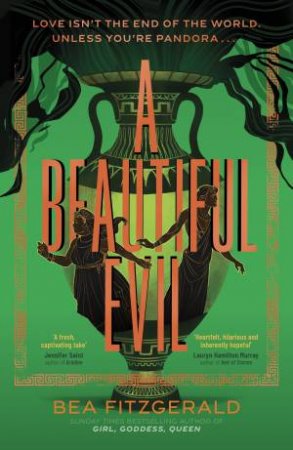A beautiful evil by Bea Fitzgerald

Pandora is the ‘beautiful evil’ sent by the gods to unleash misery on mankind. Most would know the story of Pandora, the foolish woman overcome by curiosity to open the forbidden box, and who releases all the evils to befall the world, with only ‘hope’ the last good thing that might offer some relief. Bea Fitzgerald takes this tale and turns it on its head. What if this is just the story that has been passed down the generations, always blaming the woman? Perhaps there is another side to it. Just as she wrote in The end crowns all, history is the story of the victors; there may be a different story that has been conveniently dropped from memory. Pandora may be a scapegoat for the gods’ malevolence and man’s weakness.
In Fitzgerald’s story, Pandora has the intelligence to question her purpose and fight her destiny. She understands that she has been created as the first human woman, to be beautiful and desired by Epimatheos, but the curiosity she has been endowed with leads her to ponder why Zeus has ordered her creation, and why he wants her to captivate the brother of Prometheus, the man he perpetually tortures. She continually questions the reasons she is both ‘all-gifted’ and ‘all giving’, and turns over every impulse in her mind. How much of her nature is preordained, and how much is something of ‘herself’, if there is such a thing.
In Fitzgerald’s story curiosity is not a bad thing, it’s a kind of intelligence, that continually explores the meaning of things, and how everything works. Pandora endeavours to understand herself and outwit the gods. It’s an intelligence that wins the respect and adoration of her husband Epimatheos, just as much as her shapely beauty.
For romance lovers, this novel has it all, the barbed wit of their prickly conversations, to the passion of their all-consuming physical attraction. It is a positive that Epimatheos loves Pandora for all her qualities, despite their bickering quarrels, and comes to appreciate and trust her intelligence above all. And for readers of Greek mythology, Bea Fitzgerald offers a very different and truly fascinating interpretation of an old story, one that even includes an authentic depiction of neurodivergence as well as non-binary gender.
Themes: Greek mythology, Identity, Curiosity, Love, Destiny, Neurodivergence.
Helen Eddy